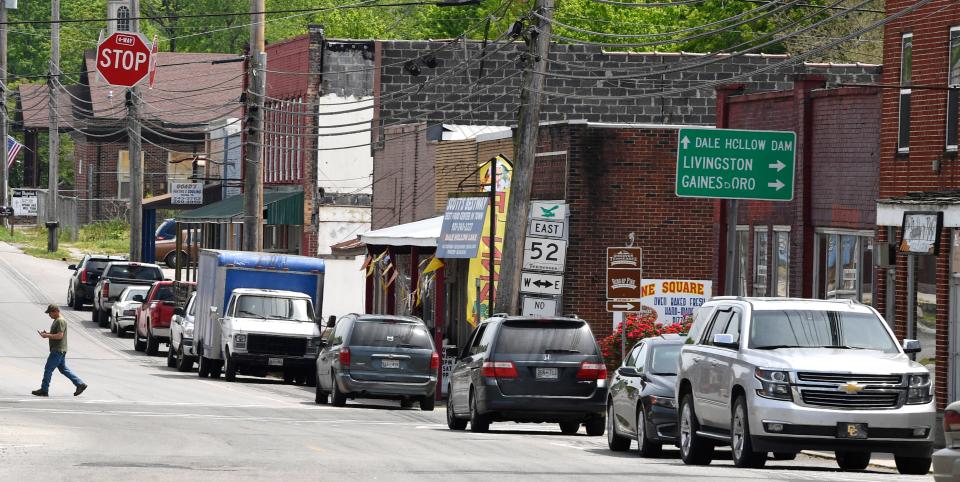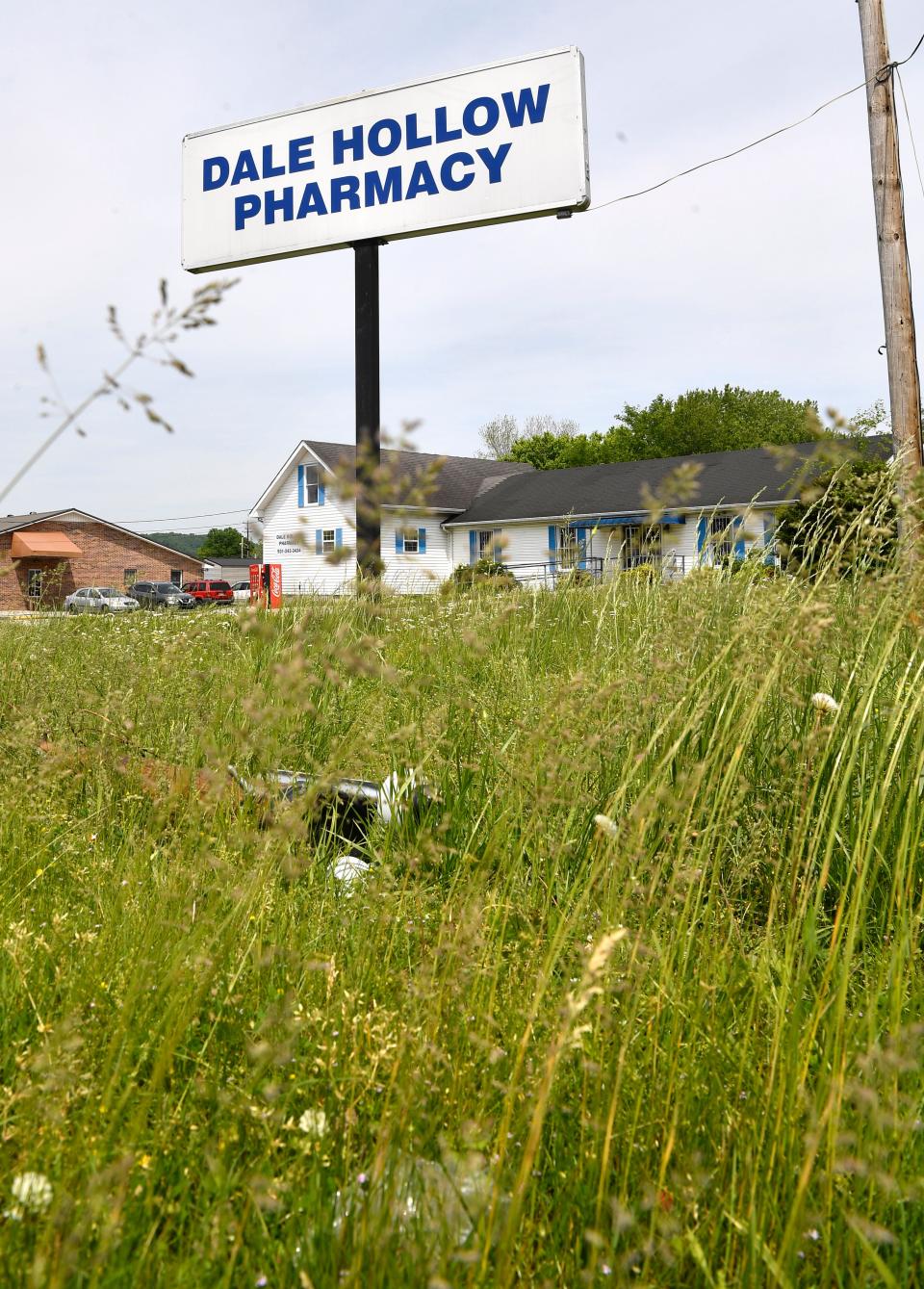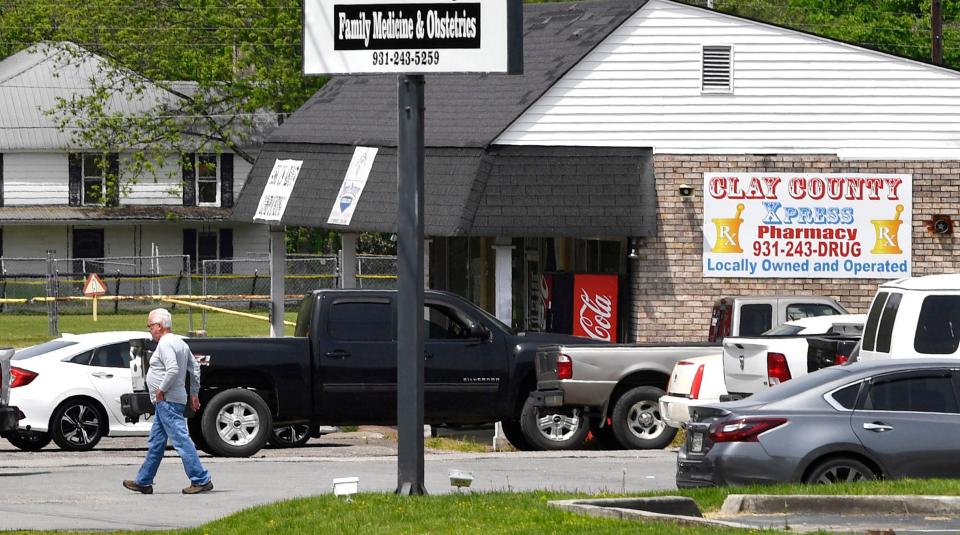Prosecutors link several Tennessee opioid cases to two Clay County pharmacies in new court filing
A Clay County pharmacy with a monkey. A Clarksville pastor and doctor accused of running a pill mill. A Smyrna physician overprescribing oxycodone.
For years, these cases were siloed. Now, prosecutors have shown for the first time how they are connected.
A federal court document filed this month outlines how previously unconnected cases against opioid prescribers connect through two small-town pharmacies where millions of pills were dispensed for prescriptions that prosecutors say wouldn't be filled elsewhere.
Prosecutors say that patients would travel for as long as nearly three hours with prescriptions from unscrupulous medical professionals across Middle Tennessee to the small town of Celina, which has only about 2,000 people and where the nearest Walmart is half an hour away across the Kentucky border. One of the pharmacy employees charged with opioid-related crimes even drove patients to doctors where they could get the prescriptions, prosecutors say.
KFF Health News previously reported that in 2017, Celina pharmacies filled nearly two opioid prescriptions for every Clay County resident — the highest in Tennessee and more than three times the national rate — according to the Centers for Disease Control and Prevention.

The medical professionals that prosecutors connected to Celina's Dale Hollow Pharmacy and Xpress Pharmacy have been indicted or convicted in opioid-related crimes. The providers include a doctor in the same town and others “a distance from the pharmacies whose patients traveled to Celina to fill their controlled substances at these pharmacies."
Prosecutors linked the following providers to the two Clay County pharmacies:
Gilbert Ghearing of Celina, convicted of 22 counts of prescribing controlled substances without legitimate medical purpose, 21 counts of health care fraud and two counts of obstruction of justice in March 2023. A court filing says that Ghearing died on Jan. 24, 2024. Before his death, he asked the court to reverse his conviction or grant him a new trial, but the motion was not ruled on.
Bowdoin Smith of Carthage, convicted of three counts of unlawful distribution of controlled substances in July 2023. Smith has asked the court to reverse his conviction or grant him a new trial, arguing that, among other things, instructions provided to the jury were contradictory. The judge has not ruled.
Hau La of Absolute Medical Care in Smyrna, convicted of 12 counts of unlawful distribution of a controlled oxymorphone, morphine and oxycodone in July 2022. In December 2023, a judge sentenced La to one year and one day in prison followed by three years of supervised release. La argues he received ineffective assistance from counsel at his trial and has asked the court to set aside his sentence. The judge has not yet ruled.
Samson Orusa of Clarksville, convicted of 13 counts of unlawful distribution of a controlled substance, 12 counts of health care fraud, nine counts of money laundering and one count of maintaining a drug-involved premises in August 2021. Most of those convictions were overturned, however, based on a 2022 Supreme Court decision. Orusa, who is also the pastor at God's Sanctuary Church International, was granted a new trial on all charges except for the health care fraud counts. In August 2023, he was sentenced to seven years in prison and three years of supervised release, and ordered to pay $1,159,388 in restitution and forfeit seized assets worth approximately $900,000. Read more about Orusa here.
Willard West of Lebanon, who pleaded guilty to three counts of unlawful distribution of a controlled substance in May 2023. He is scheduled to be sentenced in March.
Hemal Mehta, a Brentwood physician, and Heather Marks, a Murfreesboro nurse practitioner, indicted in October 2019 on one count of conspiracy to unlawfully distribute controlled substances and nine counts of unlawful distribution of controlled substances, including oxycodone and oxymorphone, according to prosecutors. They have not yet gone to trial.
A news release from the U.S. Attorney's Office from 2021 said that the owners and a pharmacist at Xpress Pharmacy created flyers marketing that they sold Subutex — a drug designed to treat opioid addiction but that itself can be abused — and delivered the flyers, as well as trays of cookies, to medical clinics around Tennessee whose doctors wrote prescriptions for Subutex.
More: Ahead of a Tennessee opioid trial, lawyers squabble over a monkey named Carlos
The case against the Celina pharmacies
Four former owners of Dale Hollow Pharmacy and Xpress Pharmacy, both of which have since closed, were indicted in November 2021 on a variety of federal charges, including conspiracy to distribute controlled substances and violating anti-kickback statutes. The indictment covers the owners’ alleged misconduct from 2014 to 2019.
Three of the former owners will go to trial in April. One has pleaded guilty.
The same year the indictment against the owners was unsealed, two pharmacists at Dale Hollow and Xpress pleaded guilty to similar charges that were filed within the previous two years.
Prosecutors lay out the facts of the case beginning in 2012, when William Donaldson, the owner of Donaldson Pharmacy, which later became Dale Hollow Pharmacy, pleaded guilty to illegally dispensing hydrocodone to a patient. He was sentenced to 15 months in prison.

Ownership of the pharmacy transferred to Donaldson’s sister and brother-in-law Charles Oakley. But with Donaldson gone, many patients switched to nearby Xpress Pharmacy, owned by Pamela Spivey, a former employee of Donaldson’s.
About the same time that Donaldson was released from prison in spring 2014, Thomas Weir purchased a majority interest in Dale Hollow Pharmacy and hired Donaldson to work as a greeter in an attempt to bring back some of his old clients.
To try to make the pharmacy profitable, prosecutors say that Weir, Oakley, Donaldson and others orchestrated several “schemes,” including defrauding Medicare and Medicaid, and indiscriminately dispensing dangerous drugs and offering illegal kickbacks to patients to fill their prescriptions at Dale Hollow. At some point, Dale Hollow Pharmacy even allegedly distributed its own currency, called “Monkey Bucks,” inspired by Donaldson's pet monkey named Carlos who was a frequent sight in the business, prosecutors say. Prosecutors say that from 2014-2019, Medicare Part D and TennCare, Tennessee’s Medicaid program, paid $7.4 million in reimbursements to Dale Hollow Pharmacy for patient prescriptions "procured through kickbacks and bribes."
The plan seemed to work. Dale Hollow recruited its patients back, while Spivey’s Xpress Pharmacy began struggling financially. She sold a majority interest of Xpress to Weir in 2015, and prosecutors say Weir brought to the pharmacy several of the schemes that he had run at Dale Hollow.
Both pharmacies were shut down in February 2019 by a temporary restraining order entered in the U.S. District Court for the Middle District of Tennessee.
Prosecutors revealed the link between Dale Hollow, Xpress and the seven Middle Tennessee medical professionals in a filing from Feb. 1 in the case against Weir, Donaldson and Spivey.

Just two months before their trial, the defendants’ lawyers asked a federal judge to dismiss the case for selective prosecution, arguing that because others haven’t been prosecuted — they name the Sacklers of Purdue Pharmaceuticals and executives of Walgreen’s Pharmacy as two examples — they shouldn’t be, either.
Prosecutors called the argument “utterly baseless” in their Feb. 1 response to the defendants’ motion to dismiss.
Oakley pleaded guilty in January 2024. The remaining defendants are scheduled to go to trial on the following charges:
Donaldson: One count of conspiracy to unlawfully distribute and disperse controlled substances, one count of conspiracy to commit health care fraud and one count of conspiracy to commit health care fraud and make false statements related to health care matters
Spivey: One count of conspiracy to unlawfully distribute and disperse controlled substances, one count of conspiracy to commit health care fraud and two counts of health care fraud
Weir: One count of conspiracy to unlawfully distribute and disperse controlled substances, one count of conspiracy to commit health care fraud, two counts of health care fraud and one count of conspiracy to commit health care fraud and make false statements related to health care matters
Evan Mealins is the justice reporter for The Tennessean. Contact him at emealins@gannett.com or follow him on X, formerly known as Twitter, @EvanMealins.
This article originally appeared on Nashville Tennessean: Opioids in Middle Tennessee: Several cases linked to Celina pharmacies

